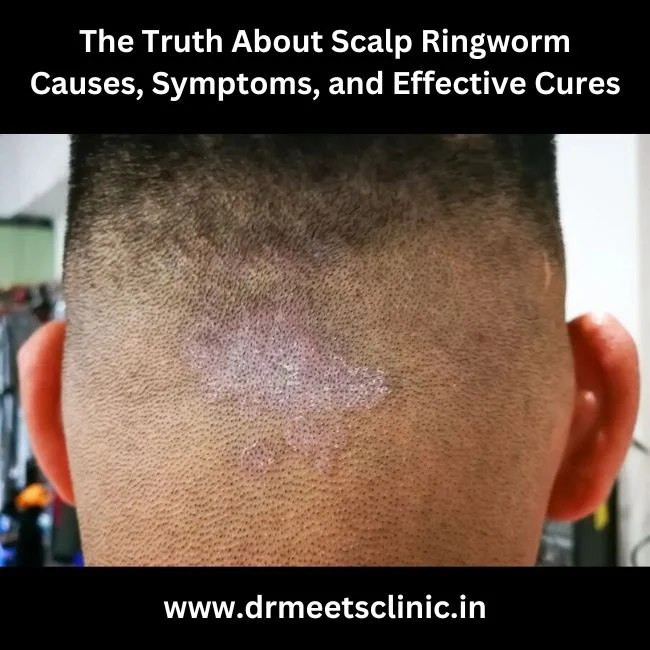Scalp ringworm, also known as Tinea Capitis, is a common fungal infection that affects the skin of the scalp. Contrary to what its name implies, dermatophytes—a type of fungal infection—cause ringworm instead of worms. This infection can lead to various uncomfortable and unsightly symptoms such as itchy, scaly patches on the scalp and hair loss. Scalp ringworm is highly contagious and primarily affects children, though adults can also contract the infection. This blog will explore the causes, symptoms, and most effective cures for scalp ringworm, offering insights on how to prevent and treat this condition.
What is Scalp Ringworm?
A fungal infection that affects the scalp and hair shafts is known as scalp ringworm, or tinea capitis. It is caused by fungi that thrive in warm, moist environments, making the scalp a perfect breeding ground if conditions are right. The infection can spread quickly through direct contact with infected individuals or contaminated objects such as combs, towels, hats, and even surfaces.
Tinea Capitis typically appears as circular, red, scaly patches on the scalp, and if left untreated, it can lead to hair loss, permanent scarring, and other severe complications. The condition is more prevalent in children, especially those who are in close contact with each other, such as in schools and daycare centers.
Causes of Scalp Ringworm
Dermatophyte Fungi
Dermatophytes, a type of fungus that feeds on keratin—a protein present in hair, nails, and the outer layer of skin—are the main culprits behind scalp ringworm. These fungi can penetrate the outer layers of the skin and hair follicles, leading to infection.
The most common dermatophytes responsible for scalp ringworm include:
Trichophyton species
Microsporum species
These fungi are responsible for the circular, ring-like patches on the scalp, which is where the term “ringworm” comes from.
Direct Contact
Scalp ringworm is highly contagious and can spread from person to person through direct contact. Children are particularly vulnerable because they often share personal items like hats, combs, and towels, which can easily harbor the fungus.
Contact with Animals
Another way scalp ringworm can spread is through contact with infected animals, especially pets like cats, dogs, and even farm animals. Many pets can carry the fungus without showing any visible signs of infection, making it harder to detect the source.
Infected Surfaces and Objects
The fungi that cause scalp ringworm can survive on surfaces and objects for long periods, making it possible to contract the infection by touching contaminated items or surfaces. Shared objects like hairbrushes, bedding, clothing, and even public surfaces in gyms or playgrounds can be breeding grounds for the fungus.
Symptoms of Scalp Ringworm
The symptoms of scalp ringworm can vary depending on the severity of the infection, but they often include the following:
Itchy, Scaly Patches
The infection typically begins as small, itchy patches of scaly skin on the scalp. These patches are often circular or ring-shaped, which is characteristic of ringworm infections.
Hair Loss
As the infection progresses, hair in the affected areas may become brittle and break off, leading to small, bald patches on the scalp. In some cases, the hair loss can be more extensive, leaving large bald spots.
Red or Inflammatory Lesions
In more severe cases, the infected areas may become red and inflamed, sometimes forming pus-filled sores known as kerion. If left untreated, these lesions may cause excruciating agony and result in lifelong scarring.
Swollen Lymph Nodes
In some cases, people with scalp ringworm may experience swollen lymph nodes in the neck or around the scalp area as the body responds to the infection.
Crusting and Scaling
The affected scalp may develop a thick crust of skin, and the scaling can spread to other parts of the scalp if left untreated. This symptom can be particularly distressing and uncomfortable for those suffering from the infection.
Effective Cures for Scalp Ringworm
While scalp ringworm is a stubborn infection, it is treatable with proper care and medication. Here are some of the most effective ways to cure and manage the condition:
Oral Antifungal Medications
The primary treatment for scalp ringworm is oral antifungal medications. Since the infection affects the hair follicles, topical treatments alone are usually not effective. The most commonly prescribed oral antifungals include:
Griseofulvin: A traditional antifungal medication that has been used for decades to treat scalp ringworm. It is often taken for several weeks to ensure complete eradication of the infection.
Terbinafine: Another commonly prescribed antifungal, Terbinafine is often preferred for its shorter treatment duration compared to Griseofulvin.
Itraconazole and Fluconazole: These antifungal medications may also be prescribed, especially in cases where other treatments have not been effective.
The choice of medication and the duration of treatment depend on the severity of the infection, the patient’s age, and any other underlying health conditions.
Topical Antifungal Treatments
While oral medications are the primary treatment, topical antifungal shampoos or creams can also be used to help control the spread of the infection and reduce symptoms. Antifungal shampoos containing ketoconazole or selenium sulfide can help cleanse the scalp and reduce fungal activity. These shampoos should be used in conjunction with oral medications, as they are not sufficient on their own to treat scalp ringworm.
Hygienic Measures
Preventing the spread of scalp ringworm is crucial, especially in households or environments where close contact is common. In order to lessen the chance of the virus spreading:
Steer clear of exchanging hats, towels, and hairbrushes.
Disinfect commonly used surfaces and objects.
Wash bedding and clothing in hot water to kill any lingering fungi.
Ensure pets are examined for ringworm and treated if necessary.
Home Remedies
While antifungal medications are essential for curing ringworm, some home remedies can help soothe symptoms and promote healing. These remedies should not replace medical treatment but can be used alongside it:
Aloe vera: Aloe vera has soothing properties that may help reduce itchiness and inflammation on the scalp.
Apple cider vinegar: To clean the scalp and lessen fungal activity, use diluted apple cider vinegar as a scalp rinse.
Prevention of Scalp Ringworm
Avoid sharing personal grooming items.
Keep your pets clean and inspect them regularly for signs of ringworm.
Clean any surfaces and personal belongings that could be home to fungi.

















